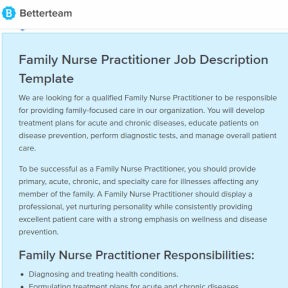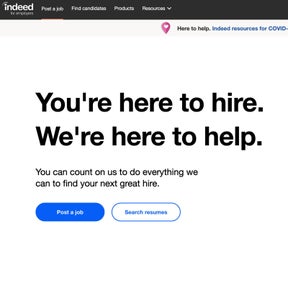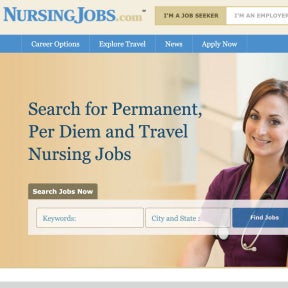How to Find Nurses:

A step-by-step guide to finding top-quality nurses for your hospital or medical center. Includes a full hiring process that will help you find and hire the best nurses fast.
Create a job post.
Write the perfect nurse job description.

The best nurses combine technical proficiency with compassion and good bedside manners. If you want to attract the best nurses, you have to go the extra mile.
Nurses will often favor your hospital over others if you have the following:
- A large roster of nurses to avoid long shifts and burnout.
- A healthy nurse-to-patient ratio.
- Great incentives, including signing bonuses (some hospitals are offering between $10,000 and $20,000), retention bonuses, and benefits.
- Relocation allowances for nurses moving from a different state.
- Good relationships between nursing staff and supervisors.
- Mentoring programs.
- Excellent facilities.
Use a nurse job description template.

Use a nurse job description template as your guide to creating the perfect job post. This will provide you with much of the boilerplate information you'll need, such as responsibilities and qualifications, making your task a bit easier.
Distribute your job ad.
Post your ad on general sites, such as Indeed.

Start by posting to general job posting sites like Indeed. These are great places to start because they get plenty of traffic and they're free.
Make sure your job is picked up by Google.

You'll want to ensure your site is picked up by [Google for Jobs] too. Google for Jobs allows your posting to be seen in search results. This can greatly increase your job visibility. You can get it picked up by Google by having someone properly format it on your website, or by using a service that creates a properly formatted jobs page for you automatically.
Target dedicated job boards for healthcare professionals.

Your next step is to target nursing job posting sites. This will narrow your search to people who work as nurses. Find out how to source nurses by using a job posting site for nurses to advertise vacancies.
Introduce job sustainability programs.
Appeal to millennials.

Millennials differ from older generations of nurses in that they are more open to career advancement and new job opportunities, making retaining millennial nurses a difficult task. There are a few ways of getting around this:
- Ensure that there are career advancement prospects.
- Grant them access to continuing education and development.
- Offer tuition reimbursement for nurses who stay on for more than five years.
- Foster a culture of inclusivity and diversity in your hospital.
- Ensure they have access to the latest technology to do their jobs.
- Provide excellent mentorship and open communication.
- Offer recognition of their work and constructive feedback.
- Be a value-driven medical center.
Form partnerships with local nursing schools.

Partnering with nursing schools opens up a path for the recruitment of promising nursing students. It also allows for continual education without any burden on the school.
- Start by targeting nursing schools in the vicinity of your hospital.
- Contact each school's campus career service office and inquire about forming a partnership.
- Ask about attending campus job fairs.
- Speak to the campus career service office about starting a nursing clinical program with their school.
- Talk to them about the opportunities your medical practice can offer to promising students.
- Connect with nursing professors and teaching staff and build strong relationships with them. They're your best source of identifying promising students.
Develop a nursing clinical program.

Nursing clinical are like internships. Nursing students spend 12-16 months working alongside experienced nurses and doctors, applying their knowledge in real-world scenarios and continuing their professional development.
Nursing clinical is the best way of hand-picking the best students to supervise and train as prospective employees at your hospital.
- Offer nursing clinical as part of nursing students' degree program.
- Speak to your partner college to determine whether the clinical can count towards college credit. This will further incentivize students to apply.
- Promote your clinical at campus job fairs.
- Interview and select students you feel have potential.
- Treat their clinical as you would any employment. Give them a proper onboarding, allocate resources to them, and make them feel attended to.
- Ensure that the program is well-structured and emphasize the educational benefits. Provide clear learning objectives and goals, as well as assignments and daily responsibilities. These can include assisting nurses and doctors in obstetrics and pediatrics, acute and long-term care, and more.
- Market your students as testimonial figures who speak about the benefits of nursing clinics with you.
- Ask your current nurses and doctors for feedback on the students. Get their input on which students they could see themselves working with as colleagues.
- Ask your students to refer you to other students at their college whom they rate highly.
- Offer your students the chance of full employment pending the success of their clinical.
Screen your nurse applicants.
Send out screening questions via email.

People often overlook job requirements and apply anyway. Filter out the unqualified ones by sending out a short email that asks a few basic questions, such as:
- How long have you worked as a nurse?
- Are you licensed in the state?
- Are you available to work on weekends?
This way, they cannot ignore your questions. If you're worried that your applicants may not be responsive to an email, you may want to try delegating someone to make short phone calls to ask these questions.
The National Council of State Boards of Nursing (NCSBN) has a national database for the verification of nurse licensures. Search the NCSBN database to confirm your candidates' registration as nurses.
Conduct background checks.

Once you've narrowed your candidate pool, you'll need to conduct background checks to verify their employment history, application details, criminal record, and more.
Conduct interviews.
Conduct phone interviews.

In-person interviews take up a lot of time for everyone involved. You can schedule short phone interviews and quickly learn which candidates are the best to continue investing your time in.
During these interviews, review the screening questions to see if their answers are consistent, check that their expectations for salary and benefits line up with yours, and find out why they no longer are at their previous job.
Example questions:
- What brought you to the medical field?
- Why did you leave your last nursing job?
- What do you expect for salary and benefits?
- What days are you available to work?
- When would you be able to start?
- What made you interested in this job?
Use this step as an opportunity to identify red flags. If they left their previous job because of issues that you know will be present at the position you're offering, for example, having to work weekends, the candidate won't be a good fit. The same if they want a salary that's outside your range, or they cannot work during your business hours.
For candidates that meet your standards at this point, be sure to review the highlights of taking the job, and see if there are any other questions they have. Remember to keep selling the job, as they may be entertaining other offers.
Pay attention to why they're interested in the job, and reiterate particulars of it they're most attracted to.
Conduct in-person interviews.

At this point, you've got most of what you need to know if a candidate is a right fit for you. An in-person interview will give you insight into how you'd work with them, whether they're reliable, and how they'll fit in with the rest of your staff.
More importantly, it's a chance to continue selling them the job. Introduce them to co-workers, show them around, review the reasons they want to take the job and the benefits you offer.
Your questions should gauge their experience with different nursing procedures, including measuring blood pressure, giving injections, making hospital beds, and more. You should also probe their bedside manners, their attitude towards patient care, their organizational skills, their attention to detail, and more.
Hire a new nurse.
Conduct a pre-employment drug screening.

Depending on the state you operate in, your nurses will have to undergo a drug test before being hired. Because of the nature of the job, medical staff who fail their drug tests are at risk of losing their license to practice nursing. A failed drug test must be reported to your state's board of registered nurses.
Make an official offer.

Finding a nurse with all the right qualities is not easy, so you'll want to make them an offer fairly quickly, to take them off the job market before another company finds them. This is often best done in an informal call first, followed by a offer letter or email that provides the job description, salary, and benefits information.

